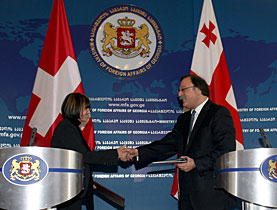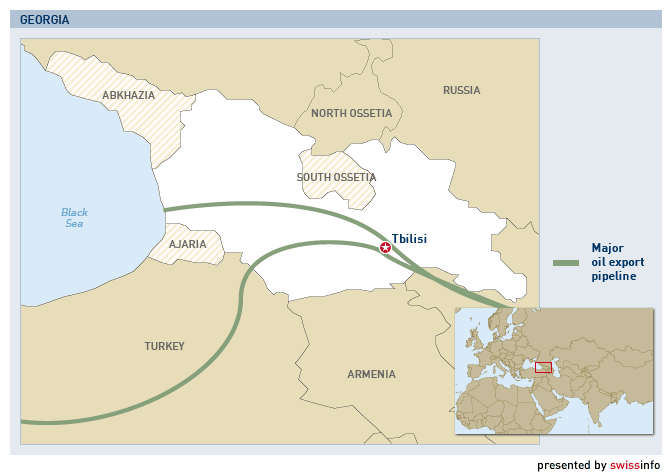Swiss step in to ease Caucasus tensions

Georgia has agreed to be represented by Switzerland in Russia, paving the way for diplomatic ties with Moscow to be restored.
Foreign Minister Micheline Calmy-Rey was in Georgia on Monday to finalise a Good Offices agreement which enables Switzerland to act as a third party “channel of communication” between the two governments.
The same protecting power mandate was signed with Russia in December.
The two sides severed diplomatic ties after Russian troops entered Georgia in August to repel a Georgian military attempt to retake the Moscow-backed breakaway region of South Ossetia.
Under the twin mandates Switzerland will represent Georgian interests in Russia and Moscow in Tbilisi. Similar mandates are in place between the United States and Cuba and Iran, and Iran and Egypt.
The mandate for Georgia was agreed by the Swiss cabinet. Calmy-Rey met Georgian Foreign Minister Grigol Vashadze in Tbilisi on Monday to formalise the deal.
Calmy-Rey said it was an “honour” that the two countries had requested Switzerland’s involvement in attempting to resolve the conflict and a sign of the “recognition of Swiss professionalism”.
In granting the mandate to Switzerland last month, Russian Foreign Minister Sergei Lavrov said it would contribute to the normalisation of the situation in the region and was “proof of the trust the Russian government has placed in Switzerland”.
Cuban model
The agreement resembles the model used in Cuba where the United States runs its consular services out of the Swiss embassy in Havana.
The Swiss foreign minister said it would take a “little time” for the Good Offices to come into force for both countries.
But Jeronim Perovic, a political scientist from Basel University, warned the Good Offices agreement was a “much appreciated” but technical service that would not necessarily have an impact on the resolution of the conflict between the two countries.
“If Switzerland wants to play a more active part in conflict resolution, Bern needs to come forward with diplomatic initiatives beyond the Good Offices, for example by offering to host and/or mediate direct talks between Russia and Georgia, for example in Geneva,” he told swissinfo.
“Ultimately, however, it is up to Georgia and Russia to find a solution to this conflict,” he added.
Communication
The Swiss delegation to Georgia, which included diplomats and a political security expert, also visited the European Union and the Organisation for Security and Cooperation in Europe observer missions for the region.
An EU representative told the delegation that observers in charge of monitoring the current ceasefire agreement no longer had access to South Ossetia and could not enter the neighbouring Georgian town of Perevi.
According to the ceasefire plan put together by French President Nicolas Sarkozy and signed by Moscow and Tbilisi, European observers should have access to the “entire Georgian territory”, he said. But this changed when Russia recognised South Ossetia as independent after the fighting ended in August.
The Georgian foreign minister added that Russia had seriously violated its commitments and called on the international community to put pressure on Moscow to find a solution.
During the visit, Calmy-Rey refused to be drawn on whether Switzerland would adopt a more active mediating role, saying one of the main roles of the protective power mandate was to “keep the channels of communication open”.
swissinfo, Jessica Dacey
The pro-Moscow enclave of South Ossetia in the Caucasus broke from Georgia as the Soviet Union split apart in the 1990s, but has no international status.
Georgia began a new offensive to regain control over South Ossetia in August, launching heavy rocket and artillery fire and air strikes. In response, Russia, which has granted passports to most South Ossetians, launched overwhelming artillery shelling and air attacks on Georgian troops.
A preliminary ceasefire was signed on August 12, 2008, although fighting did not stop immediately. Russia recognised the independence of South Ossetia after the fighting. The United Nations refugee agency has estimated the number of those displaced in Georgia and South Ossetia to be up to 30,000.
A first set of talks between Russia and Georgia, brokered by the European Union and other international bodies, failed to get started because of disagreements about whether representatives from South Ossetia and Abkhazia should take part, and how.
Swiss diplomat Heidi Tagliavini, a former deputy head of the UN observer mission in Georgia, will lead the EU’s investigation into the chain of events in the conflict.
Good offices are initiatives taken by a third party to stop litigation or make contact easier between two conflicting parties. More generally it refers to any initiative or contribution that encourages peace and international cooperation.
As a neutral country, Switzerland has made good offices one of the pillars of its foreign policy. These can take different forms, for example organising international conferences, representing the interests of a foreign state and playing host to international organisations.
A protecting power mandate is required if two states break off diplomatic ties. Switzerland carried out such mandates since World War I but there has been less of a need for the mandates in recent years. At present Switzerland has four such mandates in place: representing the United States in Cuba, Cuba in the US, Iran in Egypt and the US in Iran.


In compliance with the JTI standards
More: SWI swissinfo.ch certified by the Journalism Trust Initiative











You can find an overview of ongoing debates with our journalists here . Please join us!
If you want to start a conversation about a topic raised in this article or want to report factual errors, email us at english@swissinfo.ch.